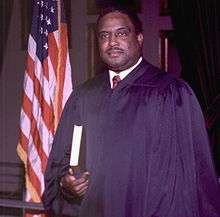Joseph W. Hatchett
Joseph Woodrow Hatchett (born September 17, 1932)[1] is an attorney in private practice and was formerly a United States Circuit Judge of the United States Court of Appeals for the Fifth Circuit and later the United States Court of Appeals for the Eleventh Circuit.
Joseph Woodrow Hatchett | |
|---|---|
 | |
| Chief Judge of the United States Court of Appeals for the Eleventh Circuit | |
| In office September 20, 1996 – May 14, 1999 | |
| Preceded by | Gerald Bard Tjoflat |
| Succeeded by | R. Lanier Anderson III |
| Judge of the United States Court of Appeals for the Eleventh Circuit | |
| In office October 1, 1981 – May 14, 1999 | |
| Appointed by | operation of law |
| Preceded by | Seat established |
| Succeeded by | Charles R. Wilson |
| Judge of the United States Court of Appeals for the Fifth Circuit | |
| In office July 13, 1979 – October 1, 1981 | |
| Appointed by | Jimmy Carter |
| Preceded by | Seat established by 92 Stat. 1629 |
| Succeeded by | Seat abolished |
| Personal details | |
| Born | Joseph Woodrow Hatchett September 17, 1932 Clearwater, Florida |
| Education | Florida A&M University (B.A.) Howard University School of Law (J.D.) |
Education and career
Born in Clearwater, Florida, Hatchett graduated from Florida A&M University with a Bachelor of Arts degree in 1954. He served in the United States Army as a lieutenant from 1954 to 1956. He graduated from Howard University School of Law with a Juris Doctor in 1959. He was in the private practice of law in Daytona Beach from 1959 to 1966. He was a cooperating attorney for the NAACP Legal Defense Fund from 1960 to 1966.[2] He served in the United States Marine Corps Reserve as a lieutenant colonel and judge advocate from 1977 to 1988. He was a consultant for the Daytona Beach Urban Renewal Department from 1963 to 1966. He was an Assistant United States Attorney for the Middle District of Florida from 1966 to 1971. He was First Assistant United States Attorney from 1967 to 1971. He was a special hearing officer for conscientious objectors in the United States Department of Justice from 1967 to 1968.
In 1975, Governor Reubin Askew appointed Hatchett to an Associate Justice seat on the Florida Supreme Court, replacing David L. McCain, who had resigned from the court while being investigated for corruption.[3] Retained in office in the 1976 general election,[2] Hatchett served until 1979, and was the first black man to serve as a Florida Supreme Court Justice post-Reconstruction, and the first black man successfully retained on the Florida Supreme Court in a statewide election.[4][5] Governor Askew noted at the time of his appointment that Hatchett's race was a "major consideration" in his selection, coming only a few years after the appointment of Thurgood Marshall as the first black U.S. Supreme Court justice.[3]
Federal judicial service
Hatchett served as a United States Magistrate of the United States District Court for the Middle District of Florida from 1971 to 1975.[5]
Hatchett was nominated by President Jimmy Carter on May 17, 1979, to the United States Court of Appeals for the Fifth Circuit, to a new seat authorized by 92 Stat. 1629. He was confirmed by the United States Senate on July 12, 1979, and received his commission on July 13, 1979. His service terminated on October 1, 1981, due to reassignment to the Eleventh Circuit.[5]
Hatchett was reassigned by operation of law on October 1, 1981, to the United States Court of Appeals for the Eleventh Circuit, to a new seat authorized by 94 Stat. 1994. He served as Chief Judge from 1996 to 1999. His service terminated on May 14, 1999, due to retirement. He was Member of the Judicial Conference of the United States from 1997 to 1999.[5]
Post-judicial career
As of April 2018, Hatchett was an attorney with the law firm Akerman LLP (formerly Akerman Senterfitt) in Tallahassee, Florida.[2]
Honors
Hatchett holds an honorary Doctor of Laws (LL.D.) degree from four institutions, including Florida Memorial College (1978), Stetson Law School (1980), Florida A&M University (1996) and Howard University (1998).[2]
References
- "Joseph W. Hatchett 1932 - Google Search". www.google.com.
- "Joseph W. Hatchett". Akerman Senterfitt. Archived from the original on 5 October 2008. Retrieved 8 January 2009.
- "New Justice Brings State Distinction", Fort Myers News-Press (September 2, 1975), p. 6A.
- "Justice Joseph W. Hatchett". Florida Supreme Court. Retrieved 8 January 2009.
- Joseph Woodrow Hatchett at the Biographical Directory of Federal Judges, a public domain publication of the Federal Judicial Center.
External links
- Joseph Woodrow Hatchett at the Biographical Directory of Federal Judges, a public domain publication of the Federal Judicial Center.
| Political offices | ||
|---|---|---|
| Preceded by David L. McCain |
Justice of the Florida Supreme Court 1975–1979 |
Succeeded by Parker Lee McDonald |
| Legal offices | ||
| Preceded by Seat established by 92 Stat. 1629 |
Judge of the United States Court of Appeals for the Fifth Circuit 1979–1981 |
Succeeded by Seat abolished |
| Preceded by Seat established |
Judge of the United States Court of Appeals for the Eleventh Circuit 1981–1999 |
Succeeded by Charles R. Wilson |
| Preceded by Gerald Bard Tjoflat |
Chief Judge of the United States Court of Appeals for the Eleventh Circuit 1996–1999 |
Succeeded by R. Lanier Anderson III |